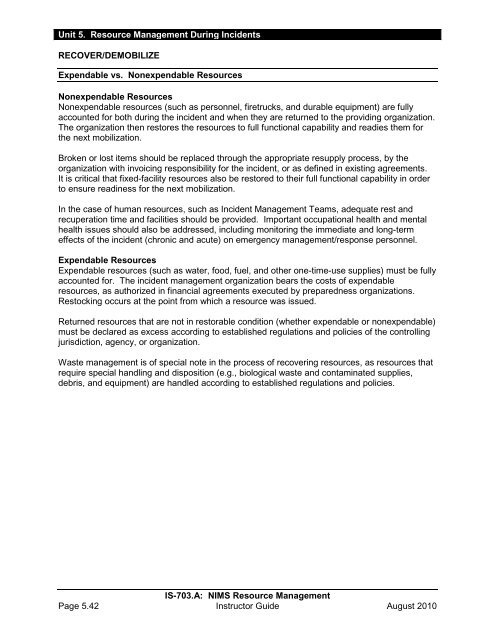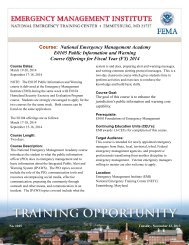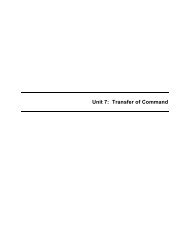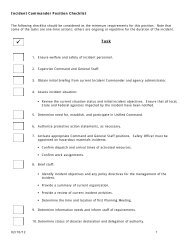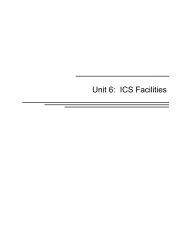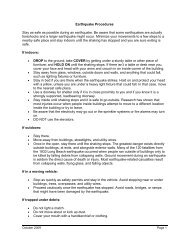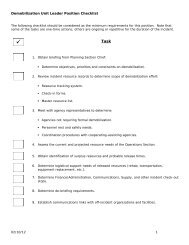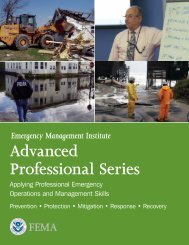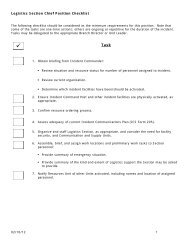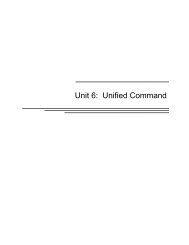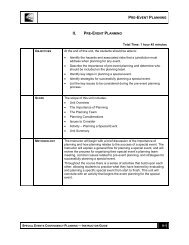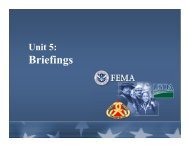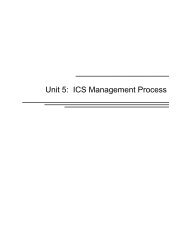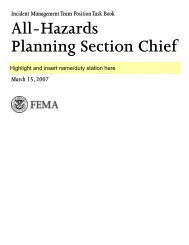IS-703 NIMS Resource Management - Emergency Management ...
IS-703 NIMS Resource Management - Emergency Management ...
IS-703 NIMS Resource Management - Emergency Management ...
You also want an ePaper? Increase the reach of your titles
YUMPU automatically turns print PDFs into web optimized ePapers that Google loves.
Unit 5. <strong>Resource</strong> <strong>Management</strong> During Incidents<br />
RECOVER/DEMOBILIZE<br />
Expendable vs. Nonexpendable <strong>Resource</strong>s<br />
Nonexpendable <strong>Resource</strong>s<br />
Nonexpendable resources (such as personnel, firetrucks, and durable equipment) are fully<br />
accounted for both during the incident and when they are returned to the providing organization.<br />
The organization then restores the resources to full functional capability and readies them for<br />
the next mobilization.<br />
Broken or lost items should be replaced through the appropriate resupply process, by the<br />
organization with invoicing responsibility for the incident, or as defined in existing agreements.<br />
It is critical that fixed-facility resources also be restored to their full functional capability in order<br />
to ensure readiness for the next mobilization.<br />
In the case of human resources, such as Incident <strong>Management</strong> Teams, adequate rest and<br />
recuperation time and facilities should be provided. Important occupational health and mental<br />
health issues should also be addressed, including monitoring the immediate and long-term<br />
effects of the incident (chronic and acute) on emergency management/response personnel.<br />
Expendable <strong>Resource</strong>s<br />
Expendable resources (such as water, food, fuel, and other one-time-use supplies) must be fully<br />
accounted for. The incident management organization bears the costs of expendable<br />
resources, as authorized in financial agreements executed by preparedness organizations.<br />
Restocking occurs at the point from which a resource was issued.<br />
Returned resources that are not in restorable condition (whether expendable or nonexpendable)<br />
must be declared as excess according to established regulations and policies of the controlling<br />
jurisdiction, agency, or organization.<br />
Waste management is of special note in the process of recovering resources, as resources that<br />
require special handling and disposition (e.g., biological waste and contaminated supplies,<br />
debris, and equipment) are handled according to established regulations and policies.<br />
<strong>IS</strong>-<strong>703</strong>.A: <strong>NIMS</strong> <strong>Resource</strong> <strong>Management</strong><br />
Page 5.42 Instructor Guide August 2010


